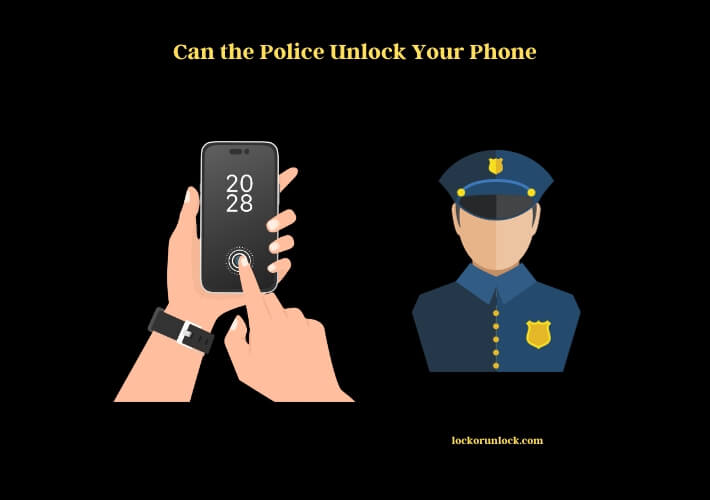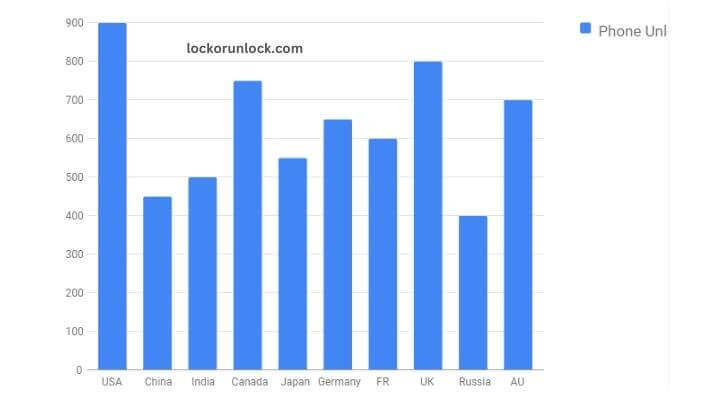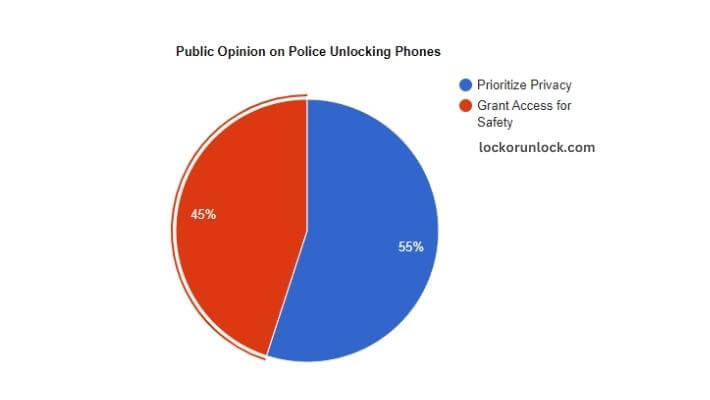Can the police unlock your phone? Yes, but under specific circumstances.
In many jurisdictions, law enforcement agencies possess the tools and technology to access the contents of a phone. If you’re wondering whether the police can unlock your phone without a password, the answer is yes. There are specialized devices and software that enable them to bypass security features on various phone models, including iPhones and Samsung phones. In emergency situations, the urgency might justify their actions, but the legalities surrounding such actions can be complex.
If you use biometric features like fingerprint or facial recognition, you might be curious if officers can compel you to unlock your device. In some places, the law is still evolving on this matter. While they might have the capability to do so, whether they can legally force you to use your fingerprint or face to unlock your phone is a topic of debate and can vary based on local laws and regulations.

Many online platforms, including Reddit, have discussions where users share experiences and knowledge about how law enforcement accesses locked phones. While the technical details might vary, the consensus is that with the right tools, unlocking a phone is feasible for them.
For a more in-depth discussion on this topic, we invite you to continue reading the detailed article below.
The Legal Landscape: Rights and Regulations
U.S. Constitutional protections: Fourth Amendment implications
Ever wondered how your phone’s security ties in with the Constitution? The Fourth Amendment protects citizens from unreasonable searches and seizures. So, if the police want to peek into your phone, they generally need a warrant. But like all things legal, there are exceptions and nuances.
Court rulings and precedents: Key cases shaping the debate
The courts have been busy with this topic! There have been several landmark cases where individuals challenged the police’s right to access their phones. Some rulings favored the individual’s right to privacy, while others leaned towards the needs of law enforcement. It’s a tug-of-war between privacy and safety.
Technological Capabilities: Beyond the Password
Tools and software: How they bypass security features
Tech-savvy police departments have gadgets that can crack phone passwords. These aren’t your everyday devices; they’re specialized tools designed to break through even the toughest security barriers. It’s like having a master key for digital locks.
Evolution of phone security: From PINs to biometrics
Remember the days of the humble 4-digit PIN? Now, we’ve got facial recognition and fingerprint scans. As our phones got smarter, so did their security features. But with every new feature, there’s always someone trying to find a way around it.
Biometrics: Fingerprint and Facial Recognition
The rise of biometric security: A timeline
From sci-fi movies to our pockets, biometric security has come a long way. It started as a futuristic concept and is now a standard feature on most phones. But how did we get here? Let’s take a trip down memory lane.
Law enforcement’s stance on compelling biometric unlocks
Can an officer make you press your finger or show your face to unlock your phone? It’s a gray area. Some argue it’s like handing over a physical key, while others see it as a violation of personal rights. The debate rages on.
| Year | Percentage of Mobile Users Using Biometric Features |
| 2018 | 40% |
| 2019 | 50% |
| 2020 | 60% |
| 2021 | 65% |
| 2022 | 70% |
Emergency Situations: Balancing Safety and Privacy
Defining emergencies: What qualifies?
An emergency isn’t just when you forget your phone’s password. For the police, it could be a life-or-death situation or a ticking time bomb scenario. In these cases, accessing a phone might be crucial. But who gets to decide what’s truly urgent?
Legal exceptions and justifications in urgent scenarios
Even in emergencies, the law has a say. There are specific situations where the police might get a pass to access your phone without a warrant. But these are rare and come with their own set of rules.
The Global Perspective: How Other Countries Handle Phone Unlocks
Comparing U.S. practices with other nations
The U.S. isn’t alone in this digital dance. Other countries have their own rules and regulations about phone access. Some are stricter, while others might surprise you with their leniency. It’s a global puzzle with each piece shaped by cultural and legal differences.
International laws and treaties affecting phone access
It’s not just about individual countries. International treaties can influence how nations approach phone unlocks. These agreements can either tighten the leash or give more wiggle room for law enforcement.

Public Opinion: What People Think About Police Access
Survey results: Public sentiment on the issue
Opinions are like smartphones; almost everyone has one. Surveys show a split in public sentiment. Some folks prioritize their privacy, while others believe in granting access for the greater good. Where do you stand?
Factors influencing public opinion: Privacy vs. safety
It’s not just about personal experiences. Media coverage, high-profile cases, and even political climates can sway public opinion. It’s a delicate balance between individual rights and collective security.

Protecting Your Phone: Steps to Enhance Security
Best practices for setting strong passwords
Setting a password is easy, but setting a strong one? That’s an art. Mix up letters, numbers, and symbols. Make it long, and change it regularly. Think of it as a digital fortress for your personal data.
The pros and cons of biometric features
Biometrics sound fancy and futuristic, right? They offer quick access and added security. But they’re not foolproof. Just like any security feature, they have their strengths and weaknesses.
Steps to Secure Your Mobile Device
Step 1
Use a mix of letters, numbers, and symbols in passwords.
Step 2
Opt for two-factor authentication.
Step 3
Regularly update your phone’s software.
Step 4
Be cautious of unknown apps and downloads.
Step 5
Turn off unnecessary location services.
Calculator: Assessing Your Phone’s Security Strength
Input factors: Phone model, security settings, and more
Your phone’s security isn’t just about a strong password. The model, software version, and even your settings play a role. It’s like a puzzle, with each piece contributing to the bigger picture.
Output: A score indicating your phone’s security level
Ever wished you could gauge how secure your phone really is? With this calculator, you can! Input your details, and get a score. It’s like a health check-up, but for your phone.
Frequently Asked Questions (FAQs)
Can the Police Unlock My Phone Without a Warrant?
In most cases, the Fourth Amendment protects citizens from unreasonable searches and seizures, which includes accessing the contents of your phone. Generally, the police would need a warrant to unlock and search your phone. However, there are exceptions, such as exigent circumstances where immediate action is required, like in life-threatening situations.
Is My Phone’s Biometric Feature Safe from Police Access?
Biometric features, like fingerprint and facial recognition, offer a convenient way to unlock phones. But legally, the waters are murky. In some jurisdictions, you might be compelled to unlock your phone using biometric features, as it’s viewed differently than providing a passcode. It’s an evolving area of law, and the rules can vary based on location.
What Tools Do Police Use to Unlock Phones?
Law enforcement agencies might use specialized devices and software to bypass phone security features. These tools can potentially access phones, even without a password. Companies like Cellebrite and GrayKey provide such tools to law enforcement, allowing them to access various phone models.
Can the Police Unlock My iPhone Specifically?
Yes, iPhones, despite their robust security features, can be unlocked by law enforcement using the right tools. Apple’s stance on user privacy is strong, but third-party tools have been developed to bypass iPhone security, and these are sometimes used by law enforcement.
What Happens If I Refuse to Unlock My Phone?
If you refuse to unlock your phone, the police might detain it and attempt to obtain a warrant to search its contents. Refusing to provide a passcode might be within your rights, but refusing a legal order can lead to other complications, including potential obstruction charges.
Are There Any Legal Protections for My Phone’s Data?
Yes, there are legal protections. The Fourth Amendment provides some shield against unreasonable searches. Additionally, some states have specific laws that offer further protections. It’s always a good idea to be aware of your local laws and to consult with legal counsel if you’re unsure.
How Can I Better Protect My Phone from Unwanted Access?
To enhance your phone’s security, use a combination of biometric features and strong, unique passcodes. Regularly update your phone’s software, as updates often include security patches. Enable encryption, use two-factor authentication where possible, and be cautious about the apps you install and the permissions you grant them.
Navigating the world of phone security and law enforcement access is like walking a tightrope. On one side, there’s the need to protect individual rights and privacy. On the other, there’s the need to ensure societal safety. As technology and laws evolve, so will this dynamic. Being informed is the first step in ensuring your rights are protected while also understanding the broader implications for society. So, next time you set that phone password or use your fingerprint, you’ll know a bit more about what’s at stake.
Read more:
